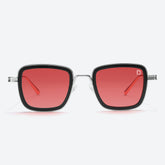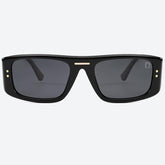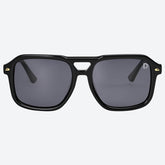A Ultimate Guide: Do Sunglasses Block Blue Light?
Blue light is everywhere, from the sun to your smartphone. But what is blue light, and why should you care about it? In this article, we will explain what blue light is, where it comes from, how it affects your eyes, and whether sunglasses can block it and protect your eyes.
What Is Blue Light?
Blue light is a type of visible light that has a short wavelength and high energy. It is part of the electromagnetic spectrum, which ranges from gamma rays to radio waves. The visible light spectrum, which is the light that we can see, is composed of different colors, each with a different wavelength and energy. Red light has the longest wavelength and the lowest energy, while blue light has the shortest wavelength and the highest energy.
Where Is Blue Light Produced?
Blue light is produced by natural and artificial sources. The main source of blue light is the sun, which emits all colors of visible light. Blue light is also present in the sky, which is why it appears blue. Artificial sources of blue light include LED lights, fluorescent lights, computer screens, smartphones, tablets, TVs, and other digital devices. These sources emit more blue light than natural sources, and we are exposed to them for longer periods.
Why Should We Protect Our Eyes from Blue Light?

Blue light has both benefits and drawbacks for our health. On the one hand, blue light can help regulate our circadian rhythm, which is our natural sleep-wake cycle. It can also boost our mood, alertness, and cognitive performance. On the other hand, blue light can also have negative effects on our eyes and vision. Some of the potential risks of blue light exposure are:
- Eye strain: Blue light can cause eye fatigue, dryness, irritation, and blurred vision, especially when we use digital devices for long hours. This is because blue light scatters more than other colors, making it harder for our eyes to focus. It also reduces the contrast between the screen and the background, making it more difficult to read.
- Macular degeneration: Blue light can penetrate the retina, which is the inner layer of the eye that contains light-sensitive cells. Over time, blue light can damage these cells and cause macular degeneration, which is a leading cause of vision loss in older adults. Macular degeneration affects the central vision, which is essential for reading, driving, and recognizing faces.
- Sleep disruption: Blue light can interfere with our circadian rhythm by suppressing the production of melatonin, which is a hormone that regulates our sleep-wake cycle. Melatonin helps us fall asleep at night and wake up in the morning. When we are exposed to blue light at night, our melatonin levels decrease, making it harder for us to fall asleep and stay asleep. This can lead to insomnia, daytime sleepiness, and impaired memory and concentration.
Do Sunglasses Block Blue Light & Protect Your Eyes?
Sunglasses are designed to protect our eyes from harmful ultraviolet (UV) rays, which can cause sunburn, cataracts, and skin cancer. However, not all sunglasses can block blue light and protect our eyes from its effects. The ability of sunglasses to block blue light depends on the type, color, and coating of the lenses.
Do Regular Sunglasses Block Blue Light?
Regular sunglasses, which are usually tinted gray, brown, or green, can block some blue light, but not enough to make a significant difference. According to a study by the University of Houston, regular sunglasses can block about 15% of blue light, while clear lenses can block about 10%. This means that regular sunglasses can reduce the glare and brightness of blue light, but they cannot prevent the damage and disruption caused by blue light.
How to Protect Your Eyes from Blue Light
If you want to protect your eyes from blue light, you need to take some measures to reduce your exposure and enhance your protection. Here are some tips to follow:
Wear sunglasses outside

When you are outdoors, especially on sunny days, you should wear sunglasses that can block both UV and blue light. Look for sunglasses that have a blue light filter or a blue light-blocking coating. These sunglasses can block up to 90% of blue light, depending on the quality and brand. You can also choose sunglasses that have yellow, orange, or amber lenses, which can filter out more blue light than other colors. However, these lenses may distort color perception and contrast, so they are not suitable for driving or other activities that require accurate vision.
Reduce screen time

One of the main sources of blue light exposure is the use of digital devices, such as computers, smartphones, tablets, and TVs. To protect your eyes from blue light, you should limit the amount of time you spend on these devices, especially at night. You can also adjust the settings of your devices to reduce the blue light emission. For example, you can use the night mode or the dark mode, which can change the color temperature, and brightness of the screen. You can also use apps or software that can filter out blue light, such as Flux, Iris, or Night Shift.
Use glasses adapted to blue light

If you wear glasses, you can opt for lenses that have a blue light filter or a blue light-blocking coating. These lenses can block a significant amount of blue light, depending on the quality and brand. You can also choose lenses that have a yellow, orange, or amber tint, which can filter out more blue light than other colors.
Brightness correction
You can also protect your eyes from blue light by adjusting the brightness of your screen and your environment. You should avoid using your devices in a dark room, as this can create a high contrast between the screen and the background, which can strain your eyes. You should also avoid using your devices in a very bright room, as this can increase the glare and reflection of blue light, which can also strain your eyes. You should aim for a balanced brightness level, where the screen and the background are similar in brightness.
The Screen goes black at night

Another tip to protect your eyes from blue light is to turn off your screen at night, or at least an hour before bedtime. This can help reduce your exposure to blue light, which can interfere with your sleep quality and quantity. You can also use a blue light blocking device, such as a screen protector, a filter, or a cover, which can block or reduce the blue light emission from your screen.
Consult an ophthalmologist

Finally, you should consult an ophthalmologist regularly to check your eye health and vision. An ophthalmologist can diagnose and treat any eye problems or diseases that may be caused or worsened by blue light exposure. An ophthalmologist can also prescribe you glasses or contact lenses that can correct your vision and protect your eyes from blue light.
Sunglasses for Eye Protection
Sunglasses are not only a fashion accessory but also a necessity for eye protection. Sunglasses can protect your eyes from harmful UV rays, which can cause sunburn, cataracts, and skin cancer. Sunglasses can also protect your eyes from blue light, which can cause eye strain, macular degeneration, and sleep disruption. However, not all sunglasses are created equal. You need to choose sunglasses that can block both UV and blue light, and that suit your needs and preferences.
Things to Consider When Buying Blue Light Sunglasses
When buying blue light sunglasses, you need to consider some factors, such as:
- The type of lenses: You can choose between polarized lenses, which can reduce the glare and reflection of light, and non-polarized lenses, which can provide a more natural vision. Polarized lenses are ideal for driving, fishing, skiing, and other outdoor activities, while non-polarized lenses are better for indoor use and reading.
- The color of lenses: You can choose between different colors of lenses, such as gray, brown, green, yellow, orange, or amber. Each color has its advantages and disadvantages, depending on the light conditions and the activity. Gray lenses can provide a neutral vision and reduce the brightness of light, while brown lenses can enhance contrast and depth perception. Green lenses can balance the color and clarity of vision, while yellow, orange, and amber lenses can filter out more blue light and improve visibility in low-light situations. However, these lenses mayalso distort color perception and contrast, so they are not suitable for driving or other activities that require accurate vision.
- The coating of lenses: You can choose between lenses that have a blue light filter or a blue light-blocking coating. These lenses can block a significant amount of blue light, depending on the quality and brand. You can also choose lenses that have other coatings, such as anti-reflective, anti-scratch, anti-fog, or anti-smudge, which can improve the performance and durability of the lenses.
- The shape and size of frames: You can choose between different shapes and sizes of frames, such as round, square, oval, or aviator. Each shape and size can suit different face shapes and styles and can provide different levels of coverage and protection. You should choose frames that fit your face well, and that do not slide or pinch your nose or ears.
Conclusion
Blue light is a type of visible light that has a short wavelength and high energy. It is produced by natural and artificial sources, such as the sun, the sky, and digital devices. Blue light can have both positive and negative effects on our health. It can help regulate our circadian rhythm, mood, alertness, and cognitive performance, but it can also cause eye strain, macular degeneration, and sleep disruption. To protect our eyes from blue light, we need to wear sunglasses that can block both UV and blue light, reduce our screen time, use glasses adapted to blue light, adjust the brightness of our screen and environment, turn off our screen at night, and consult an ophthalmologist regularly. Sunglasses are not only a fashion accessory but also a necessity for eye protection. When buying blue light sunglasses, we need to consider the type, color, and coating of the lenses, and the shape and size of the frames. By following these tips, we can enjoy the benefits of blue light, while avoiding its risks.






